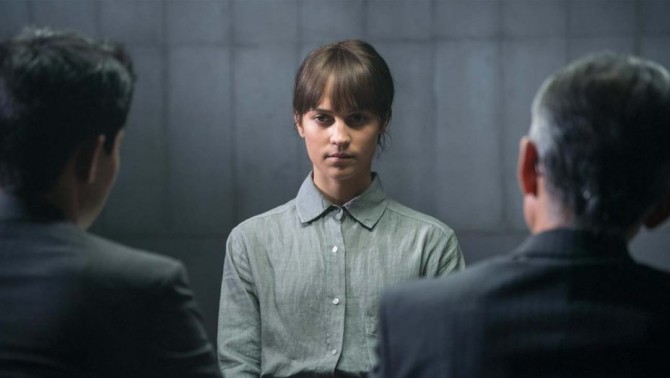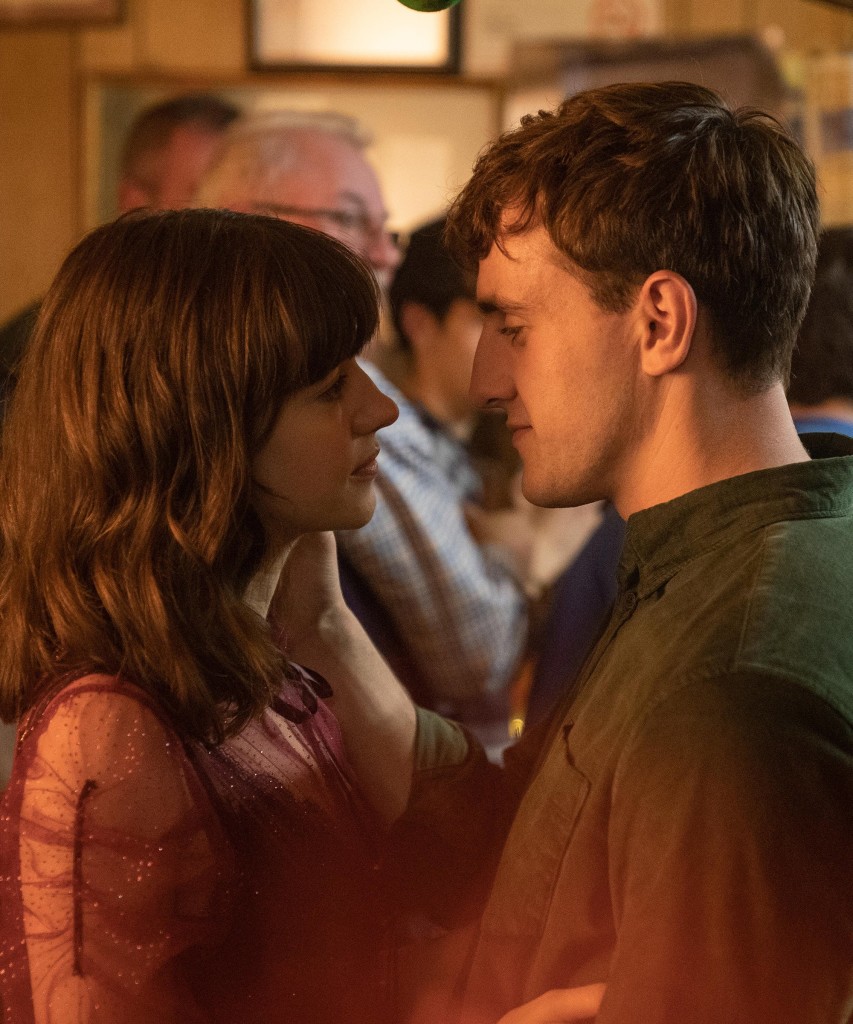What if Hannibal Lecter was a woman? Oh, and a vampire killer.
Genre: Supernatural
Premise: A young female detective hunts down a serial killer who she begins to believe is killing vampires.
About: This script sold a few days ago to Screen Gems. Stranger Things producers, 21 Laps, are on board to produce. The script comes from the writing team of Gregg Hurwitz and Philip Eisner. Eisner has been doing this for a long time. He wrote the 1997 cult sci-fi film, Event Horizon. But Hurwitz has an even more interesting history. He wrote the 2017 film, Book of Henry, which, legend has it, got Colin Trevorrow booted from Star Wars 9. To my knowledge, these two have only written one other project together, Sweet Girl, starring Jason Mamoa, which will follow a father determined to protect his daughter after his wife’s murder.
Writers: Gregg Hurwitz & Philip Eisner
Details: 120 pages
We live in a polarized society at the moment. People are aligning on either side of heavily charged slogans. Basic everyday activities are politicized. And I’m tired of holding in my feelings about all of it. I’m ready to make a statement that’s going to be really unpopular but I don’t care. You can yell at me or cancel me or whatever you want to do. I’m through. I’m ready to speak my truth:
The only way to make serial killer screenplays work anymore is by including vampires.
I’m serious.
Okay, maybe not totally serious.
But mostly serious.
If there’s ever been a genre hurt more by two movies, it’s the serial killer genre. 25 years ago, we had the two best serial killer movies ever. Silence of the Lambs and Seven. And nobody – NOBODY – has written one that’s even come close to those films since.
We are chasing ghosts, people. It’s not possible to write a serial killer movie as good as those so why even try?
Well, good news. There’s a caveat. Vampires. OR! Ghosts. OR! werwolves. OR! robots. The only way to bring freshness into this genre is through supernatural or sci-fi means. Because, otherwise, the only thing your readers are going to be thinking about when they read your basic b#tch serial killer script is, “God, Silence of the Lambs was so much better than this.”
And that’s what today’s writers have done. As soon as the supernatural element kicked in here, I breathed a sigh of relief. Because I knew this wasn’t going to be the 287th serial killer script I’ve read in a row that was one-tenth as good as Seven.
‘Not even 30 yet’ Jersey Payton works robbery as a cop. But that’s about to change. There’s been a beheading by a serial killer known as “The Guillotine” just outside Los Angeles. This is really bad news because The Guillotine kills multiple people in one city at a time before hibernating for years and moving on to a new city where he starts over again, making him impossible to track.
However, they don’t usually find the heads of his victims until he’s long gone. The fact they’ve found a fresh one means they have a shot at catching him. The FBI races into the Los Angeles Police Department and say they need whichever cop created their latest profiling program. That cop happens to be Jersey.
Jersey teams up with her partner, George Kim, and start checking out leads her cool program spits out. One of those leads leads them to 40-something Anna Cole. Anna is a nobody. She’s invisible to the world. But when she speeds off in her car while being questioned, the shocking truth is revealed. The Guillotine is Anna Cole, a woman!!!
They catch Anna and, surprisingly, the bulk of the rest of the movie is an interrogation. Anna likes Jersey for some reason, which forces the department to let her do most of the interrogating. It’s here where Anna reveals what she’s done. She’s not a serial killer, you see. She’s a vampire-hunter. She’s actually saving the world, not hurting anyone.
Obviously, all the cops think she’s a nutbag. EXCEPT for Jersey. And because Jersey kinda believes her, Anna tells her about Sabine. Sabine is the real villain here. She’s a vampire who roams the world, turning others into vampires. In order to keep her identity a secret, Anna explains, Sabine will find a way into the station to kill her. With that ticking clock set, Anna has to decide if she really truly buys this and, therefore, should she protect Anna?
This was a really solid script.
One of the things you’re looking to do in spec scripts, in particular, is continue to evolve the narrative with surprises. You want to add new plot developments every 20-35 pages that keep the narrative exciting. I read too many scripts where the writers aren’t thinking about keeping the attention of the reader.
Take Palm Springs, a movie about two people who get stuck in a time loop during a wedding. (Spoilers). The first surprise occurs about halfway into the movie. We’ve been seeing Sarah wake up at her sister’s wedding every day. But we never see exactly where she wakes up. Finally, the writers show us. It’s in the groom’s room. Sarah slept with her sister’s fiance the night before their wedding (imaigne that personal hell – relieving your worst betrayal every single day).
Another big surprise occurs near the end of the second act. To understand this better, I have to explain that Nyles has been stuck in the loop for nearly 1 million days. Sarah has only been stuck in it for a few months. And they’ve become good friends during those months as Nyles has initiated her into the loop. Well, late in the movie, they have a big argument and Sarah says something like, “I’d never touch you in a million years,” and Nyles replies, “Oh please, we’ve had sex like a thousand times.” She stares at him, shocked, and Nyles is forced to admit that early on, long before she fell into the loop herself, he figured out how to seduce her every day and always had sex with her.
In “Sabine,” one of the first big surprises is that the killer is a woman. It’s a surprise to them and it’s a surprise to us. We were NOT expecting that because serial killer movies (outside of a few small ones) never have female killers. Then, about 20 pages later, we learn that Anna is a vampire killer. Talk about a surprise twist. Then, about 25 pages after that, we’re told about Sabine, the ultimate vampire lady who’s coming to kill Anna and anyone who gets in her way.
It was just the right amount of big surprise plot points to keep the reader invested.
Another thing this script did well was it found a way to take a big marketable idea and keep it cheap. The large bulk of this story takes place in an interrogation room. If this had come across my desk as a producer, I would’ve snatched it up as well. One, for the cool concpet. And two, because it’s manageable. This isn’t Seven where you’re going to new locations every four minutes. You could shoot 60 pages of this movie (the interrogation stuff) in 10 days if you were really cooking.
I’m not saying that should be at the foregront of every writer’s mind. But it should be somewhere near the middle or the back. Everyone who could make your movie is thinking about how much it will cost when they read it.
Make no mistake, the best story choices should always win. Don’t sacrifice an awesome idea to save money. But if it’s an idea that’s in that 50/50 coin flip territory, it’s better to go with the option that’s cheaper. Now that I’m thinking about it, the Hannibal set where 25 minutes of that movie took place probably cost 100 grand. That must’ve helped keep cost down quite a bit.
But anyway, this was a fun script. I like when writers mix supernatural elements into more real-world genres. So count me as a fan of Sabine.
[ ] What the hell did I just read?
[ ] wasn’t for me
[xx] worth the read
[ ] impressive
[ ] genius
What I learned: This is a great example of adding urgency into a setup that doesn’t naturally have it. Without any urgency, this is two people talking for as long as they want with no worries in the world. But adding the Sabine element (“Sabine is coming to get me”) creates a clever little ticking bomb in the audience’s mind. They are now on the edge of their seats, wondering when Sabine is going to arrive.
Is Normal People the “Titanic” of this generation? A love story that will be remembered for decades to come?
I’d been avoiding Normal People on more than one front.
I’d purchased the book and found myself reading a few pages at a time, unable to get into it. I’d throw on an episode every once in a while (the show can be found on Hulu), watch it in the background, and found myself lukewarm to the experience.
The show seemed to be a version of Twilight but without any of the things that made Twilight popular, namely that all the characters were vampires and werewolves. A Twilight show without the exciting stuff? Who’s idea was this?
But every few days I’d run into a glowing recommendation on the internet or from a friend. And then I heard that it was breaking all sorts of ratings records in the United Kingdom. That’s what really caught my eye. It’s nearly impossible to have a STRAIGHT DRAMA (not sci-fi, not superheroes, not vampires) break ratings records. So I said, “Okay Carson. No more hedging. It’s time to sit down and give this a proper shot.”
I’ll tell you the moment where it changed for me, when I knew I was watching something special.
It was when I realized the rich girl was the loser at school and the poor boy was popular. I know that seems like a minor thing but think about it. It flips one of the most common cliches in high school movies/shows on its head. The rich kids are always the cool ones. The poor kids are always the losers.
In retrospect, it was why I initially rejected the show. The setup was so different from what I was used to that I didn’t know what to make of it. It’s like anything that’s new and different. You’re not able to process it at first. I checked the episode count (12 episodes!) and was even more intrigued. How do you keep a high school relationship interesting for 12 episodes?
If you haven’t seen the show, it follows two teenagers, Marianne and Connell, who live in a small Irish town. Marianne’s family is rich. Connell’s mother is their maid. And that’s how they know each other. Connell will sometimes come by to pick up his mom. He and Marianne will share a few words and they go their separate ways.
Marianne is odd and rarely socializes at school. Contrast this with Connell, the best football player at school, the guy everyone gravitates to. Despite Connell having his pick of the litter, he can’t keep his eyes off Marianne.
She’s icy to him at first, but soon they start spending time together, and that time leads to a sexual relationship that blows Marianne’s mind. Connell is all she can think about. However, Connell is embarrassed by Marianne for reasons he can’t articulate. He can’t risk being seen with her. And so their relationship becomes a secret.
It’s a secret that works for a while. But when Connell asks another girl to the year’s final dance solely to avoid being seen with Marianne, Marianne is furious and stops talking to Connell cold turkey.
The series follows the two characters throughout the next six years as they have an extremely complicated relationship. Sometimes they get together. But more often they find new boyfriends and girlfriends, creating a never-ending flow of resistance between them.
The show puts a heavy emphasis on Marianne’s sexual journey as she searches out crazier and more intense sexual experiences that reinforce the negative feelings she has towards herself. At times it looks like life doesn’t want them to be together. And yet, somehow, Marianne and Connell always drift back together. Will they find a way? Or are they doomed to always know each other from afar?
One of the most fascinating things about this show is that there is no GOAL. There is no URGENCY. The things that normally keep a story together – there’s none of that. The series’ story engine is, simply, will they or won’t they? Will they or won’t they end up together?
‘Will they or won’t they’ scenarios are almost always secondary storylines. Never the centerpiece. Jim and Pam. Jack and Kate (Lost). You’d never be crazy enough to build an entire series whose only question is, “Will they or won’t they end up together?” But Normal People does. And somehow, against all logic, it succeeds.
Part of the reason it succeeds is because it mostly keeps its characters apart. Remember, when your characters are together, the question is answered. It’s only when they’re apart that we wonder if they’ll be together. So for these types of stories to work (think When Harry Met Sally as well), you have to keep the characters apart mostly. And as long as we love both of the characters, we’ll keep watching to get our final answer.
But that’s not the only reason you want to keep them apart. By keeping them apart, you create a TSUNAMI of subtext whenever the characters meet up. There are so many moments in this series where Marianne has a boyfriend and Connell has a girlfriend. And they’re both in town for a weekend and they run into each other and despite the fact that the characters barely say any words, the scene is BURSTING with energy because you can see all the things that they want to say but don’t.
Also, every one of Marianne’s boyfriends and Connell’s girlfriends know how close these two are. So you get a lot of great scenes where, for example, Connell comes over to a dinner with Marianne, her boyfriend, and a bunch of mutual friends. And you can see the boyfriend simmering beneath the surface, which turns what would otherwise be a boring scene into a subtext battleground. The conflict born out of competition becomes the centerpiece of the scene, even if all we’re seeing is people pour wine and pass breadsticks.
If subtext has ever confused you, stop whatever you’re doing and watch this show. This show has more subtext in it than maybe any show I’ve ever seen. It actually has so much subtext it hurts the show at times. I wished that these two would just effing tell each other what they feel. But, by and large, it works because people not being able to say what they want is more interesting than people blurting out exactly what they want.
If there’s a Top 5 List of hardest things to do in writing, creating strong unique deep challenging characters is near the top of that list. Most writers will tell you it’s the hardest thing to get right. And I agree. 99% of the characters I encounter in the scripts I read are forgettable. What’s the secret sauce to finding that 1%?
Sally Rooney, the author of the book, has an interesting approach to that. She never looks at the character individually. She always looks at CHARACTER DYNAMICS. In other words, she needs a ying to the yang. She can never do just the ying. She must understand who Connell is in Marianne’s eyes and who Marianne is in Connell’s eyes to understand the characters on a deeper level. Only then is she able to figure out their backstories and how they came to be.
And that makes sense when watching Normal People. Their relationship is very complicated and very powerful and that’s probably because Rooney conceived of them as a pair as opposed to individually. Once you know the dynamic between the characters, you can go more confidently into their past to figure out how they got there.
Something’s obviously working because the “How they got there” stuff is so powerful in Normal People. The level of detail in their individual family relationships isn’t just strong. It’s a reminder of how important it is to figure out where your characters came from. The more you know, the more realistic they’ll be on the page.
Marianne comes from a single parent family. The father is gone. This has left her brother, a drunk, as the man of the house. And he hates his sister. He never misses an opportunity to tell her how worthless she is. And since her mother likes her brother more than her, she never sticks up for Marianne. She allows him to berate her.
Once you understand what Marianne has to endure at home on a day by day basis, you realize why she’s so reclusive. Why she’s so icy towards others. Her self-esteem is bottomed out. She doesn’t believe she’s worth anyone’s attention. And, of course, that’s why she’s so drawn to Connell at first. Here’s this boy everyone likes and he sees something in her. She’s so desperate for that positive attention that she’s willing to go along with his stipulation that they don’t tell anyone.
I loved the way Rooney used contrast in her characters. Marianne is a rich girl with an unloving mother who’s unpopular. Connel is a poor boy with a loving mother who’s popular. Think about the complexity of that for a second. It would’ve been easier to give Marianne everything. She’s rich. Her mom is great. Her school life is perfect. This is how most writers think. By giving the rich character the terrible family and the poor character the loving one, it creates more layers within the characters which makes them more realistic.
That’s the ultimate goal, by the way. You’re trying to make imaginary people made of words seem as real as you and me. And as we all know, we’re all a combination of plusses and minuses. We’re full of contradictions. None of us have it all. So it makes more sense to give your characters a messier makeup.
And to Rooney’s testament, she takes that to the next level because the characters evolve over the course of the show. Connell is popular when we meet him. But once he goes off to college and isn’t good enough to play on the football team, he becomes an outsider. His popularity disappears. Meanwhile, Marianne has tons of friends at college. That’s what was so brilliant about the show. The characters kept evolving and then had to deal with those evolutions.
In retrospect, I should’ve known I’d love this. It’s directed by Lenny Abrahamson who directed my favorite movie of 2015, Room. Oh, and that’s something I didn’t even mention. The acting in this is incredible. I don’t know if there’s been better casting for a movie or show in the last ten years. I mean that. These actors are so great in their roles. To the point where I searched for interviews of them afterwards so I could see them together again.
If you’re entering The Character Piece Showdown, this is a show you’ll DEFINITELY want to check out. It’s some of the best character writing I’ve seen in a long time. But bring a box of tissues and be prepared to have your emotions jacked around for six hours. You’re going to be emotionally exhausted after this show. But it’s a good exhaustion. Trust me.
[ ] What the hell did I just watch?
[ ] wasn’t for me
[ ] worth the stream
[xx] impressive
[ ] genius
What I learned: TENSION IN SCENES. Goals are great. Stakes are great. Urgency is great. But none of that matters if there isn’t TENSION in your scenes. Tension (a form of conflict) is the secret sauce to making scenes pop. It can be anger. It can be sexual tension. It can be unspoken tension. It can be a third character adding tension. The reason this show is able to be so good in spite of a weak narrative is because the writer makes sure there’s tension in every scene.
We have a new Amateur Showdown! If you don’t know what Amateur Showdown is, it’s a screenplay tournament where I pick five scripts that were submitted to me and then you, the readers, read as much of each script as you can then vote for your favorite in the comments section. The winner receives a review the following Friday that could result in props from your peers, representation, a spot on one of the big end-of-the-year screenwriting lists, and in rare cases, a SALE!
This upcoming Amateur Showdown will be for CHARACTER PIECES ONLY. That means no action or thriller scripts. We’re talking scripts where the heart of the screenplay is about character development and character exploration. Some recent examples of character pieces would be Joker, Nightcrawler, Marriage Story, A Star is Born, Eighth Grade, The Favourite, Green Book, The Mule, Call Me By Your Name, Ladybird, The Big Sick, Moonlight, and Manchester By the Sea.
Now, obviously, there’s some leniency here since, technically, you can say that Die Hard is a character piece. John McClane is going through some serious marital issues and that’s character exploration, right? Well, you’re welcome to try and cheat the system but I’m going to be choosing scripts where the characters are the focus over the concept.
Amateur Character Piece Showdown will occur on the weekend starting August 21st. Scripts are due by Thursday August 20th by 8pm Pacific Time.
In order to participate, e-mail me at carsonreeves3@gmail.com. Include in the e-mail a pdf of the script, the script title, the genre, a logline, and a pitch to myself and potential readers why you believe your script deserves a shot. It could be long, short, passionate, to-the-point. If you want to submit your Last Great Screenplay Contest script, you are free to do that.
Also, one last suggestion. If you’ve never written a character piece before, you should do so at some point, especially if you struggle with character. I’ve found that writers who are too dependent on concept and plotting become much better writers after they’ve been forced to write a script where the driving force is how interesting the main character is.
So if you think can whip one of those up in 40 days, it might be a fun and educational exercise.
Can’t wait to see what you guys come up with. Good luck!
First off, congratulations to everyone who got their script in before the deadline. You’re probably wondering how many screenplays I’ve received and the answer is I’m not sure because I haven’t counted them all yet. But it’s somewhere between 800-1200.
I’ve read the first 10 pages of 50 of those scripts. It’s been a fun exercise so far. You never know what you’re going to get. Literally, someone sent me a script with the message, “Fun Fact: I wrote this entire script on my cell phone.” And then, in the very next entry I got a Nicholl winner. So the level of competition is all over the place.
Let’s start by detailing my filtering system. I’ve created four folders. They are, “YES,” “MAYBE HIGH,” “MAYBE LOW,” and “NO.” A “Yes” means the first ten pages were really good! When I go back for my second round of reading, I will read the entire script for any “Yes.”
“Maybe High,” means that the pages held some promise but they weren’t good enough to get me jumping up and down like I did with the yeses. When I go back for my second round of reads, I will at least read these scripts to the midpoint. If I’m bored at the midpoint, sayonara.
“Maybe Low,” is a script that hasn’t kept my interest through the first ten pages but there’s something tugging at me to give it a second chance. It may be that I like the writing. It may be that while the plotting is weak, there’s a character I’m curious about. During the second round of reads, I’ll read at least another ten pages of these scripts and, if they manage to reel me back in, I’ll keep reading.
A “No” script is pretty clear. I’m done with that script. A “no” script can basically be broken down into two categories. There are writers that can’t even write properly, like the “I wrote my script on a cell phone” guy, and then boring scripts. These are writers who obviously know the basic principles of screenwriting but their first ten pages were boring.
And if there’s one big tip to give off these first 50 reads, it’s one we discuss all the time here on Scriptshadow, which makes it all the more frustrating that it continues to be a problem.
That tip is, start off with something interesting happening. Now “interesting” is a subjective term, obviously. Some people found Hamilton interesting. I did not. But here’s a new definition for your screenwriting dictionary. Whatever you think is interesting enough to capture a reader in the first ten pages, TRIPLE that and now your scene actually has a chance at being interesting.
Cause there were a lot of opening scenes where the writer could make the technical argument that something interesting was happening. But the scene was still lame.
For example, a common start to a script is a dead body. Or a murder that just happened. Now you may say to yourself, “That’s INTERESTING!” Except that you’re competing against hundreds of other scripts that start with a dead body or a murder. So what are you going to bring to the table that’s going to make your opening murder scene more interesting than everybody else’s?
And then we have the writers who start with their characters going through their day. They wake up. They make breakfast. They do chores. I mean, come on. Even if you’re attempting a “quiet before the storm” scenario, I’m already bored on page 4 of your script. That’s the last place you a want a reader to be.
The best script I’ve read so far DOES start with a “quiet before the storm” moment but the ‘quiet’ part lasts HALF A PAGE. Not four pages. Or eight pages. Screenplays are like New York real estate. You can’t buy the land and put up some lazy generic building. You’re competing with 50,000 other buildings. You have to stand out somehow.
Anyway, back to my process.
I start off by reading the first ten pages. I do not read the logline. I avoid this because I want to see if the writing and the story pulls me in without a logline. However, if I’m struggling through the first ten, I will go back to the e-mail and check if it’s a good logline. I do this to hopefully give the read a boost, as, assuming it’s a good logline, I’ll go back into the script with more optimism.
I also check the logline after every ten page read regardless.
Now to the results so far. I have 42 “No’s” so far. I have 5 “Maybe Lows.” I have 2 “Maybe Highs.” And I have exactly 1 “Yes.”
What did the yes do that got me to say yes? Hmm, let’s see. It was a very graphic opening scene that grabbed me right away. The writer used some irony in that we start the script with a little girl walking and then she stumbles upon something that is basically the most horrible thing you can imagine. Actually, you can’t imagine it. And that’s actually a good point to note. What the girl saw was literally something I’ve never seen before. 98% of these other scripts are giving me the same stuff I’ve seen already. The same images. The same characters. The same tricks. So it really matters when someone shows me something I haven’t seen before.
But it wasn’t just that. The writing was colorful. It did a great job pulling me into the writer’s world. This is something that a lot of “NO” writers struggled with. Their writing was generic. Bland. The words and phrasing they used were basic and common. So it was hard to get pulled into their worlds. And, to be honest, when someone wrote like that, it was accompanied by similar problems in other areas. The dialogue would be very basic and bland. The scenes themselves would be unimaginative and bland.
With that said, I’ve read a couple of entries that had the opposite problem. They were vastly overwritten. So even though they were painting a more visual movie on the page than the bland writers, the paragraphs went on for too long, the words became too numerous, and it got to the point where it was gumming up the read.
Lol, so I understand your frustrations. This craft is tough. You have to strike that perfect balance.
Another common scenario I ran into was the abbreviated “exciting” opening that was then followed by 9 boring pages. It’s almost as if these writers said, “FINE, I’ll give you your exciting opening. But then I’m going to set up all my characters and my plot gosh darnit!” So they get the teaser out of the way as quickly as possible so they can say they did their job of hooking the reader right away, then follow that with nine pages of setup sauce.
It doesn’t work that way. You’re not supposed to begrudgingly give the reader their “entertainment” so that you can get on with the “more important stuff.” Regardless of whether you’re writing “fun” or “serious” scenes, they should always ALWAYS be entertaining.
As for how this is going to go moving forward. I’m going to read through this first round of 10 pages. Then I will do my second round where I start reading the good scripts in more depth, which I’ll share with you when that starts. And then I’ll probably have a group of scripts where I have to figure out who wins. Whether that be one person, two people. I’d be lying if I said I wasn’t worried that no script was good to enough to win. That’s happened to me before in a contest. But we’ll just hope that doesn’t happen here, lol.
I think I originally said I’ll announce the winner (along with the close-call scripts) somewhere around mid-September. But that’s going to be pushed back with the extended deadline and all the Covid stuff. So I’m expecting I’ll announce the winner somewhere between mid-September and mid-October. But don’t worry, I’ll be keeping you updated. I’m probably going to use these Thursday entries to talk about the contest. So you can always check back every Thursday to get the latest.
And one last thing. If you ever happen to write a screenplay on your cell phone, don’t use that as your marketing pitch for why people should read your script. :)
Genre: Sci-Fi
Premise: A woman wakes up on a spaceship that has landed on a distant planet but has no memory of how she got there or why her uniform is covered in blood.
About: This came from the 2018 Hit List. I’ll paste the info from there about the writer: “Jonni is a German-Brazilian screenwriter who has seen every inch of the globe. Born in Switzerland and raised in Spain, he moved to London to get his degree in Film & Television Production. Since then, he’s worked in advertising and the broadcast department for the London Olympics. He’s recently found himself in New York where he received his MFA in writing from Tisch School of Arts. Since finishing ASH, Jonni is working on several projects for both film and TV.”
Writer: Jonni Remmler
Details: 108 pages
It’s been a rough few days. I suffered through ten hours of people singing and dancing about the Constitution. After that, I battled through a script that had more description in it than the Bible if it were translated by Leo Tolstoy. And while my gym has finally reopened, they’ve mandated that I wear the equivalent of a hazmat suit to work out. As if I didn’t have enough excuses not to go the gym already!
It was clear what was needed. The ultimate Scriptshadow picker-upper. The thing that got me juiced to start this website in the first place. The SCI-FI SPEC! To me, sci-fi and spec screenplays are the screenwriting world’s equivalent of peanut butter and jelly, the special sauce in an In and Out burger, the blinking “Hot Now” sign on the Krispy Kreme marquee.
I needed a shot of all those things directly into my bloodstream. So take a trip with me into outer space, Adam Driver Inside Llewyn Davis style. Link hands script friends and pour yourself a milky way sarsaparilla. Actually, pour the drink first, then link hands. We’re about to be blasted off into spec script nirvana. At least I hope we are…
28 year-old Riya has just woken up in a strange futuristic room. Her uniform is covered in blood, seemingly from a large gash in her forehead. The large metallic room has all its furniture pushed up against the only door. Riya stumbles over and looks through the window in the door. There’s a hallway with a large blood stain in it. Uh-oh, don’t want to go in there.
Luckily, there’s an automatic food processor in the room so Riya can easily stay fed. In the meantime, she tries to figure out how she got here, and we experience that with her via flashbacks. She remembers earth, something about the planet dying, and possibly being part of a crew that may have fled the planet.
Eventually, Riya gets out of the room and starts seeing dead members of her crew, who all seem to have been beaten to death. She also finds a window to the outside, and that’s when she realizes she’s on some distant volcanic planet. Riya continues to remember bits and pieces of her past and zeroes in on how one member of her team, Jones, is missing. She must be the one who’s killing everybody.
Before Riya can test this hypothesis, a man named Brion shows up. He says he came down from an orbiting ship that’s part of the same team she’s on. And that he’s here because SHE sent a distress call. Since a sand storm is moving in, they’ll have to wait two days to walk back to his shuttle.
In the meantime, they try to find Jones. But, of course, there is no Jones. (spoilers!) Brion ultimately reveals himself to be the killer. And to make things worse, he’s not even human. He’s an alien entity from this planet who has slipped inside Riya’s own brain! Which means that Brion isn’t even real. Brion, aka the alien, is Riya herself. Unable to process that she’s the killer, Riya asks what happens next. Brion explains that he will slowly consume all her brain functions and she’ll cease to exist. The End.
There’s nothing bad about this script. In fact, it would’ve easily passed the Last Screenplay Contest First 10 Pages Challenge. Waking up into a strange situation with no memory of how you got there is an easy way to quickly pull readers in.
But this is the definition of what all screenwriters should be wary of: the standard execution screenplay. Standard Execution is when you have a concept and you execute it the same way 99% of other screenwriters would’ve executed it.
A girl wakes up on a spaceship with amnesia.
There’s a mystery about someone killing crew members.
A mysterious man shows up outside. Wants to be let in. He appears to be friendly. But is he?
I’ve read this exact scenario in screenplays, maybe 250 times. Not long ago, we reviewed a script about how earth lost all its oxygen and a family in a bunker lets in a couple of strangers. So it’s a common setup. And to be clear, it’s used a lot because it works. But it only works when you play with the formula in unexpected ways.
And while I wouldn’t say this feels exactly like other films. It’s familiar enough that you’re always ahead of it. That’s where you don’t want to be as a writer. ESPECIALLY if it’s a mystery script like this one. Because the whole point of adding a mystery is to give the reader an unknown experience, something where they’re constantly trying to figure out what’s going on and then you keep pulling the rug out from under them.
I’m not sure anybody reads this and doesn’t know that Riya is the one who killed everyone long before the third act reveal occurs.
Another thing I wanted to point out was there’s this prevailing belief that budgetary constraints lead to more creative choices. When 90s vagabond director Robert Rodriquez was the hottest thing in Hollywood for making an $8000 movie, he would talk about this all the time.
But I’m not so sure this is true. Because while I read this, it felt like a lot of uninspired choices were made due to wanting to keep the movie cheap. Like the fact that there’s an alien involved, but he’s always strategically in human form. Humans are cheaper to shoot than aliens. But aliens are so much cooler than humans. So did budgetary constraints in this instance really make the movie better?
And now that we’ve had some distance from Robert Rodriquez’s filmmaking heyday, can we really say that the choices in his movies made them any better? He’s certainly good at making a lot of goofy nonsense. But maybe we shouldn’t be taking advice from a guy who’s basically become the D-level version of James Cameron.
All of this is to say that special effects are getting cheaper by the year. The Stagecraft technology that they use on The Mandalorian shows just how far a dollar can go these days. So yes, you want to be aware of budget as a screenwriter. I’m not telling you to write World War 7 set on Mars in 2744. But don’t let it handcuff you if you have a really cool idea in an otherwise low-budget film.
Again, I didn’t dislike this script. I always get excited when I read a sci-fi spec and I’m always looking for the writer who’s come up with the next Source Code. I’ll continue to champion everyone writing in this genre. But this script played out too predictably for me. It needed to take more chances in its plotting.
[ ] What the hell did I just read?
[x] wasn’t for me
[ ] worth the read
[ ] impressive
[ ] genius
What I learned: One of the things you should be trying to do in a script is make your characters sound different from one another. But never do this at the expense of logic. So here, Brion comes in and he says things like, “You don’t remember none of that.” He likes to use the word “ain’t” occasionally. Astronauts are some of the most highly educated people in the world and, therefore, would never talk like this. So yes on talking differently. No on talking nonsensically. (note: this is *sort of* explained at the end but not convincingly enough to void this lesson).










